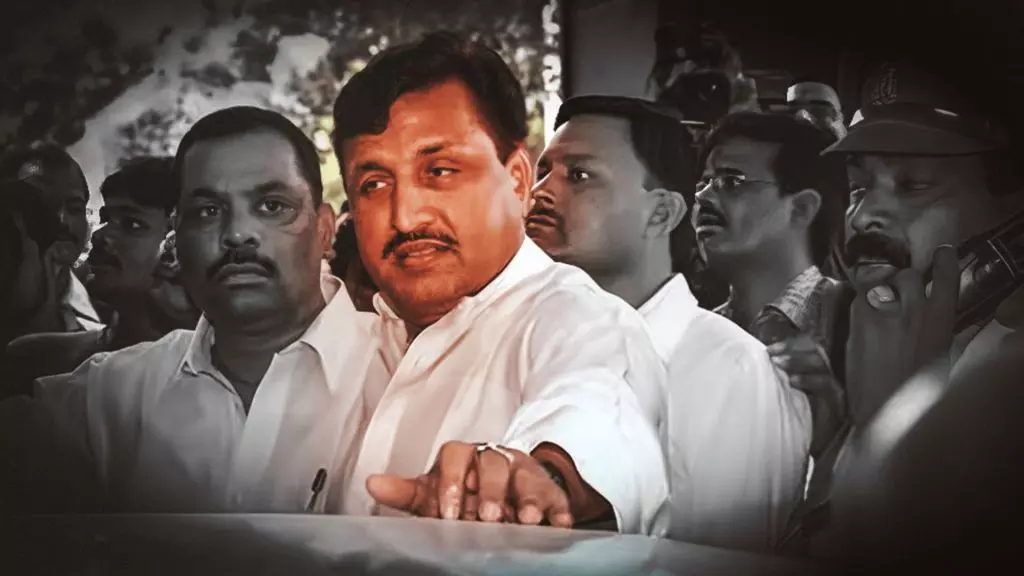
Tripathi was a minister in the Mayawati government at the time of the incident, but was sacked after Madhumita’s family charged that he was behind the murder. | File photo
Madhumita murder case: How a teen’s testimony nailed UP strongman Amarmani Tripathi
The trial judge described him as a star witness of the CBI which was asked to investigate the murder by the Mayawati-led UP govt

If a teenage boy had not stood his ground in court, Uttar Pradesh strongman Amarmani Tripathi and his wife Madhumani may not have been convicted on the charges of conspiring to kill poetess Madhumita Shukla in 2003.
Amarmani and his wife were sentenced to life imprisonment in the case, but the UP government controversially decided to waive off their remaining sentence and ordered their premature release last month. The couple was subsequently set free from jail on August 25.
Deshraj was just 14 and was employed as a domestic help in the house of Madhumita for only 48 days when two men killed her at her apartment in Lucknow on the afternoon of May 9, 2003. He saw the two men entering the house and served them tea before getting busy with household chores only to find Madhumita’s body lying in a pool of blood later.
Star witness
At the time of murder Madhumita was seven months pregnant with child of Amarmani Tripathi who was already married to Madhumani.
The trial judge described him as a star witness of the CBI which was asked to investigate the murder by the Mayawati-led Uttar Pradesh government. Tripathi was a minister in the Mayawati government at the time of the incident, but was sacked after Madhumita’s family charged that he was behind the murder.
Deshraj was brought to the house of Madhumita to work as domestic help by his maternal uncle Mangal. However, Mangal didn’t support the prosecution and turned hostile during the trial.
Deshraj was 18 when his testimony was recorded by the trial court, but he didn’t budge from his earlier statement given to the CBI while deposing in the court in 2007.
Lauded by judiciary
“It is true that at the time of occurrence, Deshraj was about 14 years of age but the manner in which he deposed in the court clearly gives an impression that he is a mature person,” said the judge while sentencing Amarmani and his wife.
According to CBI officials, Deshraj’s cross-examination went on for five days where defence lawyers put him to intense scrutiny, but he remained calm and unperturbed.
“We suspected that Deshraj’s father had come under the influence of the accused. At the time of his deposition in court in Dehradun, where the trial had been shifted due to alleged influence of the accused in Uttar Pradesh, his father too landed there in a dramatic fashion and insisted on having a word with his son. However, Deshraj stood in the witness box and refused to meet his father,” said a CBI official, pleading anonymity.
The judge noted in his order: “A person can withstand such searching cross examination for such a long period and remains so unshaken only when he had actually seen the sequence of events otherwise after such minute cross examination, the witness would break down.” The judge declared him a fully reliable witness pointing out that even though his statement as a witness consists of only 13 pages but his cross-examination by defence lawyers runs into 68 pages.
Emotional bond
CBI officials said Deshraj wasn’t much educated and had studied only up to 5th standard, but his answers were coherent. Loknath Behera, a 1985 batch Kerala cadre officer supervising the probe as DIG in the CBI then, sat with CBI lawyers and chief investigating officer T Rajahbalaji and told them to keep the deposition of Deshraj conversational and ask him to recall his 48 days that he spent in employment of Madhumita.
Deshraj had developed an emotional bond with Madhumita. The CBI needed to carefully bring the emotional bond in play during the testimony.
“Therefore the CBI lawyer kept the conversation going with Deshraj about his days with Madhumita, finally leading to the fateful day when she was killed. He recalled the exact sequence of events leading to the crime and could clearly identify the killers sitting in the court. The job was done,” said the CBI official quoted above.
To establish that Madhumita’s murder was linked to Amarmani and his wife, the identification of killers was a must. Once the killers were identified, the CBI established their links with the couple through technical and other forensic evidence, completing a chain of evidence.
Impressed with the integrity of Deshraj and his fearlessness at such a young age, the CBI officials thought of initiating an award for such witnesses in the name of Deshraj. However, the proposal to establish a “Deshraj Memorial Award” for witnesses who stand their ground despite adverse circumstances could not reach its logical conclusion.
Next Story

